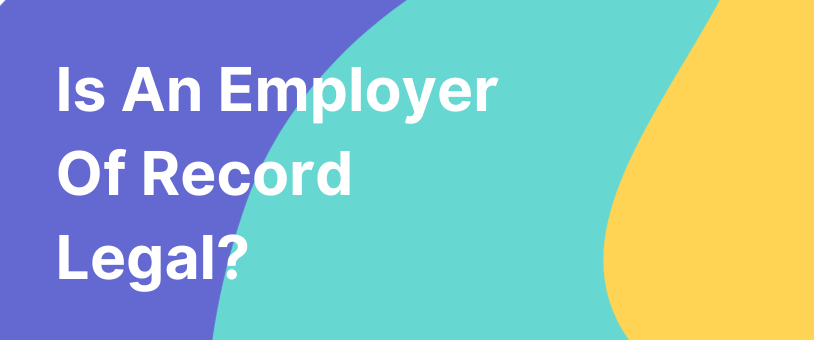Yes, an employer of record is a legal business arrangement where a company outsources its employment obligations to a third-party employer of record. This type of arrangement is commonly used by businesses that need to hire employees in a different state or country, or when they want to outsource certain HR tasks.
In an employer of record arrangement, the third-party employer of record is responsible for hiring the employees, managing their payroll and benefits, and handling other employment-related tasks.
Legalities to be aware of when using an EOR
In the past, companies would hire full-time contractors to bypass complicated employment laws in other countries. This caused legal issues because workers would be giving 100% of their working hours to a company but receiving none of the benefits like health insurance or holiday pay.
An EOR is a great modern solution to these problems. But there are still some legal considerations to be aware of when using an EOR.
EORs don’t always provide misclassification services
using an employer of record (EOR) can help ensure that workers are properly classified. Misclassifying workers as independent contractors instead of employees can result in significant fines and penalties for the employer. An employer of record can help ensure that workers are properly classified by hiring them as employees and managing their payroll and benefits. This can provide the employer with more control over the employment relationship and help avoid potential misclassification issues.
However, sometimes these services come at an additional cost. So the EOR you work with may not offer this service “out of the box” and might not be responsible for handling employee classification. This is something you should be exceptionally aware of when entering a partnership with an EOR.
Some countries have specific laws around hiring remote workers through an EOR.
Every country has different policies around hiring remotely and using an EOR. For example, in Germany, if you hire a remote employee through an EOR, they consider it as “leasing” the employee. And Germany has a set of laws and regulations around employee leasing that you need to adhere to.
Be sure to ask your employer of record what legal considerations should be taken into account before hiring from a new country.
You can outgrow an EOR
Depending on the country, you may need to switch to a permanent establishment if you plan on continuing to add more employees to your workforce.
Most countries don’t set a maximum number for EOR workers, but there are rules of thumb. “If you have one or two employees for six to 12 months, subject to the activities of the individuals, you should generally be fine. By the time you have six employees for two or three years, however, your ability to argue you don’t have a PE is going to be difficult,” Lickess says.
Tom LickessGlobal Head of International Tax Advisory – Vistra
You might need a PE based on the roles and responsibilities of workers
Depending on what your remote teams are doing, companies that don’t follow the rules, even inadvertently, may face harsh consequences, including double taxation.
“Perhaps a US company with a small UK-based sales team doesn’t believe it has a taxable presence in the UK, so it pays US taxes on its earnings attributable to for example UK or European customers,” Lickess says. “If the UK tax authority determines that the UK-based team constitutes a taxable presence or permanent establishment of the US company, then UK corporate tax may well be levied on this same income that has been subject to US tax.” Penalties and interest may also apply.
Tom LickessGlobal Head of International Tax Advisory – Vistra
Setting up a legal entity in another country can take six months or more in some cases. So you should take into account when you should start the process, depending on your growth and employee responsibilities in a specific country.
You can still be deemed the true employer in court
In some countries where a dispute over employment involving an EOR is taken to court, your company may still be found as the “true employer” of an employee, even though you’re using an employer of record.
In a recent case in New South Wales, the company Branded Media Holdings was found to be the true employer of their employees and was held liable for paying unpaid entitlements.
So using an employer of record doesn’t dismiss you of all legal liability.
Have your people talk to their people
The good news about using an employer of record is that they often have their own legal teams that you can query with concerns. EOR legal teams are specialized in employment laws in various countries and help ensure that you won’t end up in legal trouble.
If you have a legal team or legal representative, have them get in touch with the EOR you’re working with. Every country has their own set of rules and regulations around hiring remotely. Be sure to clearly understand any risks or additional considerations for hiring in specific countries.
If your remote team in a specific country continues to grow, or your employees have worked with you for more than a year, It’s a good time to revisit the legal considerations or start the process of setting up your own permanent establishment or business entity.
Recommended EORs
Remote is a robust and modern platform for remote-first teams. EOR, contractor management, payroll, benefits, and more.
Oyster is an intuitive platform that allows you to hire, pay, and care for a global team in more than 180 countries. EOR, contractor management, payroll, benefits, and more.
TFY has features for applicant tracking, freelance management, payroll, and more in a single platform. The platform supports diversity hiring and Corporate Social Responsibility (CSR) initiatives.
Lano is both a B2B & B2C platform. Businesses can use it to process global payroll, hire remote talent and manage contractors, while employees and freelancers can benefit from its payslip service, invoicing app, multi-currency wallet, and more.





